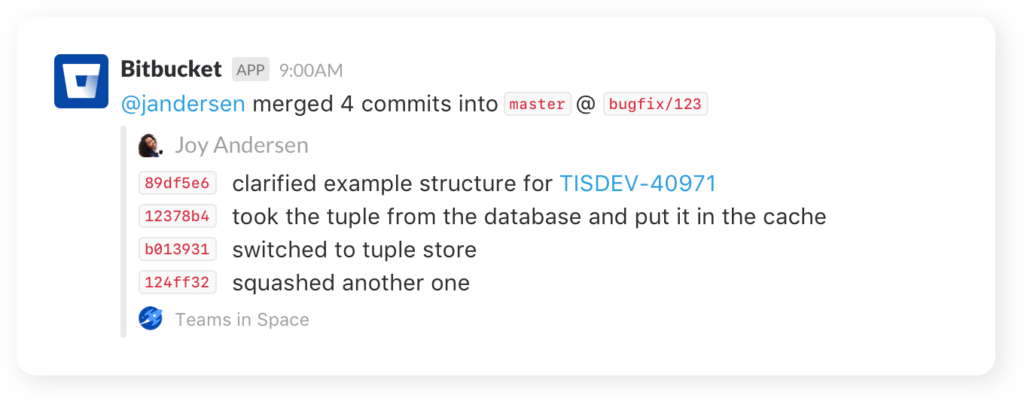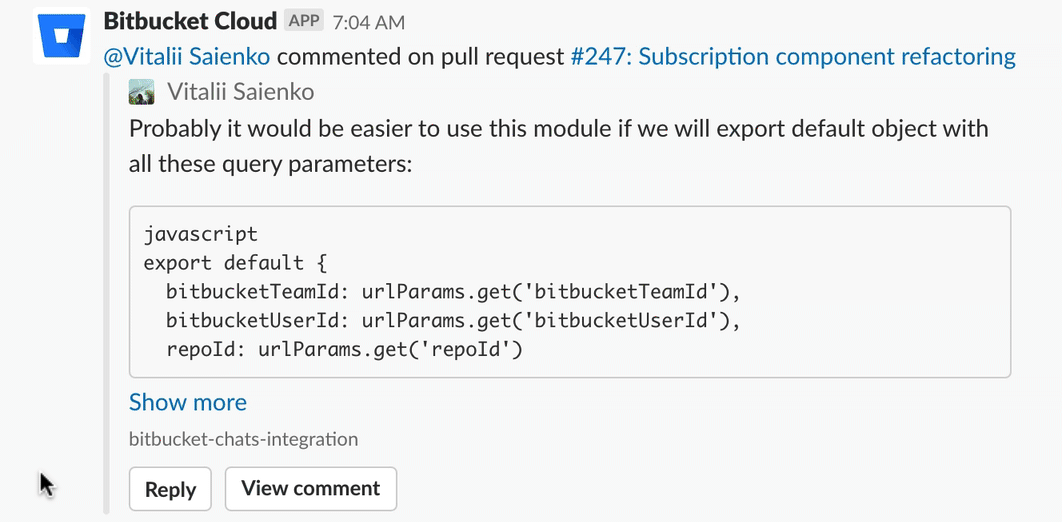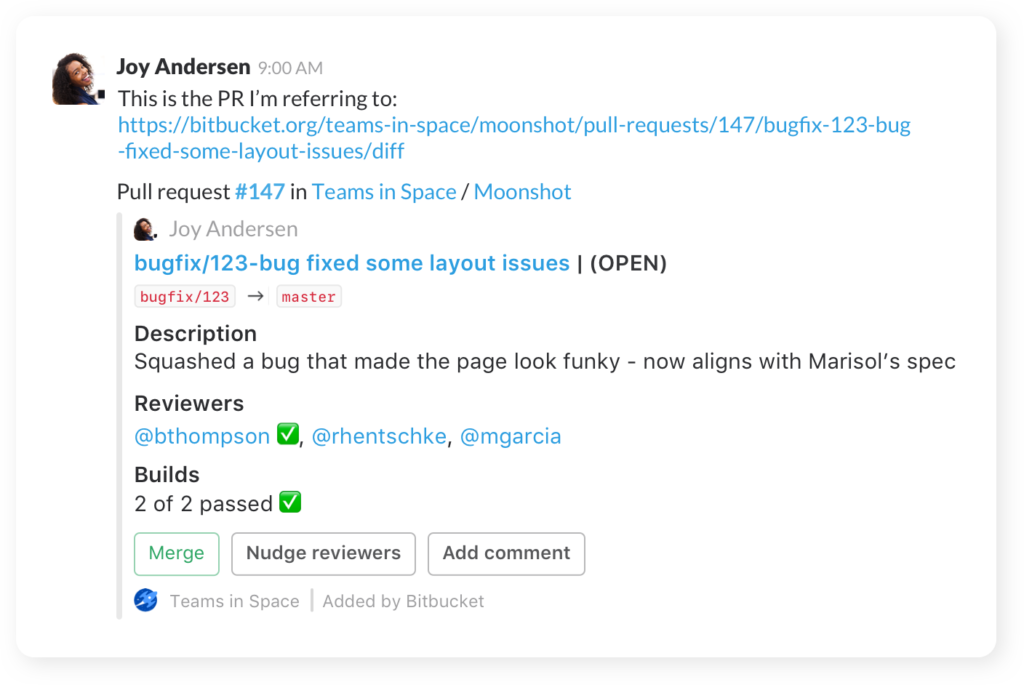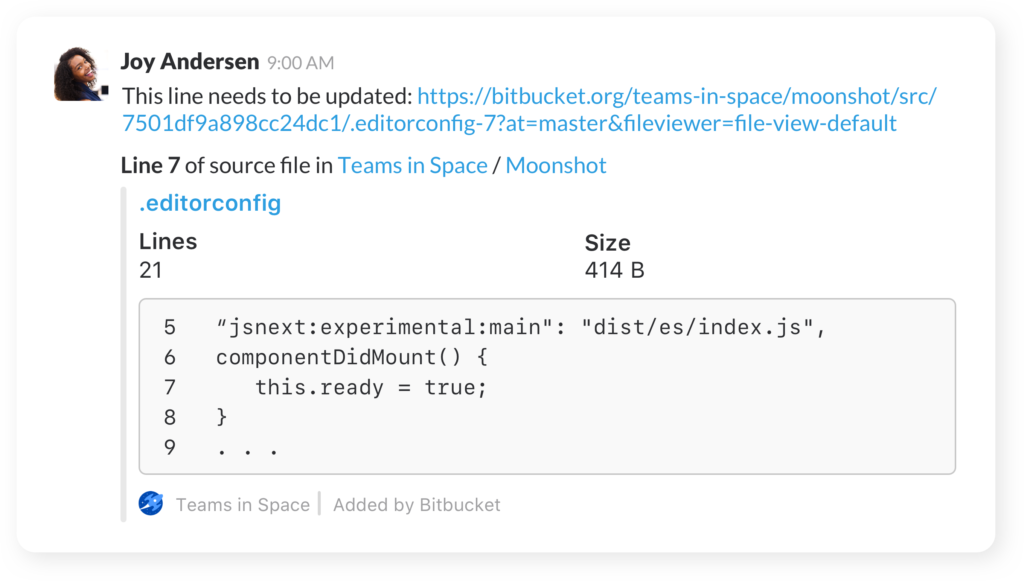Bitbucket Cloud’s new chatbot features a wide range of notification types, plenty of interactivity, and some smart configuration features that will supercharge your team’s development workflow. The bot is available today for Slack, and is coming soon to Atlassian Stride and other leading chat platforms.
Smarter, by default
Debates have sparked weighing the benefits of real-time communication and productivity costs. Being constantly inundated with notifications—both automated and human—can take their toll on any team trying to focus. By analyzing the usage of Bitbucket’s existing HipChat, Slack, and Stride integrations, we’ve carefully balanced the default notifications to provide an out-of-the-box experience customized for your team.
Wait, “an out-of-the-box customized experience” – how does that make sense? Well, when you create a chat subscription, Bitbucket performs an automated analysis of your repository and configures notifications tailored to your usage patterns.

By default, your team will be notified about important events like pull request activity and commit comments across the entire repository. However we try to be a bit smarter about less critical notifications: you’ll be notified about pushes, merges, and builds only for your primary branch—typically master or default, depending on whether you’re using Git or Mercurial.
Bitbucket detects if you’re using a Gitflow branching strategy, and will automatically notify your team when a new feature branch is created. And these are just the defaults! All notifications are fine-grained, configurable, and able to be bound to specific branches or branch patterns. Different notifications from the same repository can be configured to be sent to different channels—for example, you might send pull request events to #dev and builds or deployments to #ops—so you can tailor each repository subscription to suit your team’s needs.
Complete tasks from your channel
Bitbucket’s new chat notifications are more than just informative – you can now perform key Bitbucket tasks without leaving your channel. With a click on the notification, any member of the team (with appropriate permissions) can create a pull request from a newly pushed branch, re-run a failed build pipeline, or reply to a pull request comment.

But our favorite new feature has to be the ability to “nudge” reviewers, to gently remind your teammates that you needed that code reviewed yesterday. You no longer have to passive-aggressively click the approve/unapprove button to ping your team about it.
The notification is updated with the latest status, so the rest of the team stays in the loop with what’s happening with your builds and PRs.
Context, when you need it
Alongside notifications, Bitbucket provides contextual information from your repositories, if and when you need it. If you mention a pull request, Bitbucket will show you a summary of the salient details, highlighting the outstanding work—missing approvals, failed builds, and uncompleted tasks—required to get it merged. This helps ensure your code flows smoothly from development to production. The message buttons also work in Slack’s mobile app—so you can merge the second you get that reviewer approval or green build, even if you’re on the move!

Inline code snippets
Developers are often sending file references to each other to share code examples, or to indicate the area to make a particular change. If granted permission, Bitbucket will respond to the mention of a source url by inlining the relevant code into Slack at the specified commit. If you include a line number in the URL, Bitbucket will center the snippet on that line, saving you a trip out of your chat room.

Your personal Bitbucket bot is a click away
Bitbucket Cloud for Slack is available today, coming soon to Stride, and will eventually support other leading chat platforms.
Get started with Slack now:
- Navigate to your repository
- Click on Settings in the lefthand navigation
- Select Settings under Chat Notifications
- Connect to Slack
- Note: to uninstall the prior Slack integration, please follow directions here.
If you’re not using Stride or Slack, tell us which chat platform you’re using by clicking on the “give feedback” button in Bitbucket and help us prioritize our roadmap for future integrations. Happy chatting!